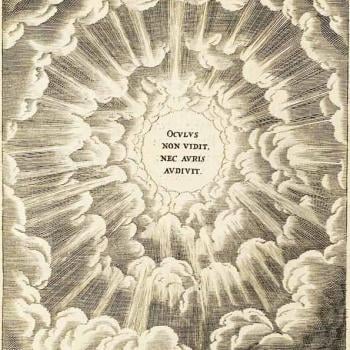
The distinction between God’s nature and energy (or energies), between God’s essence and God’s activity, has caused some confusion concerning the way that distinction is to be understood. Is it a real distinction? Is it a substantial distinction? Do the energies somehow exist separate from God’s essence, becoming an independent reality of their own? Because the distinction is called real, some critics believe this is meant to indicate a substantial division making God composite instead of simple. Others critics believe that such a distinction means that the energies are separate from God, forming independent entities in their own right, leading to the establishment of a polytheistic pantheon. While these issues have been dealt with, sometimes indirectly, in the preceding sections, it is good to deal with them here, for in doing so, it will help elucidate the basic principles presented throughout this work.
We begin with the basic notion that the uncreated energy is the eternal activity of God. It is one, although we often express it in plural, as energies, based upon the way that one activity is apprehended by us. Since God is eternal and unchanging, God’s action is eternal and unchanging. But that energy is encountered and experienced by us in our temporality. This means that God appears to act in a variety of ways, with a diversity of energies, and in that diversity, it seems that God changes. Scripture, written from a temporal perspective, gives us many examples this, such as when we see Moses apparently changed God’s plans by asking God to do so.[1]
The eternal energies of God are the means by which we predicate many names to God, names which signify God by alluding to qualities, such as love, which see coming from God. Each of these names represent something in and of themselves which we understand from our own experiences and yet when used to represent God, they point to and signify something beyond themselves as they point to the one simple essence of God which lies beyond all the names which we attribute to God. That is, these energies are distinct from God’s essence because God’s essence transcends what we understand by them when we use them to signify God. They represent the relations God has with creation. But yet, though we must distinguish them from God’s essence, it is important to realize they are not independent from God, from the divine nature, as St. Thomas Aquinas understood: “It cannot be said, however, that these relations exist as realities outside of God.”[2]
As the divine energies are not independent from God, from the divine nature, the teaching of the uncreated energies of God cannot be said to promote the notion of a pantheon of independent, separate gods. The uncreated energies all come from and point to one God, they are one with God, and they are in themselves, one, even if our apprehension of them is in and through a plurality. “From these considerations it is clear, also, that it is not prejudicial to God’s simplicity if many relations are predicated of Him, although they do not signify His essence; because these relations are consequent upon our way of understanding.”[3] Thus, St. Gregory Palamas affirmed: “Nonetheless, there is only one unoriginated essence, the essence of God; none of the powers that inhere in it is an essence, so that all necessarily and always are in the divine essence. “[4] There is only one God, undivided and simple: “This alone is God and alone is true God, the one Lord in a Trinity of hypostases, undivided in nature, will, glory, power, energy, and all the characteristics of divinity.” [5]
Divine simplicity, the realization that God is one and without parts, is not undermined by the teaching of the Trinity, because the Trinitarian persons do not divide the substance of God into parts; likewise, the divine energies do not divide the substance of God into parts. They only show us how the transcendent glory can be apprehended by us. And so, in both instances, these distinctions do not go against the oneness of God: “For the distinction in divinity is not contrary to its unity.” [6] The fact that they can be apprehended and even comprehended by us, but the divine nature cannot, establishes the fact that the distinction is real, as the names and attributes we equate through them are true; if not, we would find ourselves unable to come to know anything about God, even that God exists, for existence itself is another predicate and name which we give to God.[7] “For we know that God is only from His proper activities. Hence, for him who destroys God’s activities and does not admit that they differ from His essence, the necessary consequence is that he does not know that God is. “[8] The divine energies do not divide up the divine essence, that is, they are not substantial in nature, but they must be seen as real, meaning the distinction is real, or else, the divine nature would be broken up and overcome by our apprehensions of God. The distinction is real, but not divisive, just as the Trinitarian persons do not divide God into parts but the persons are real. It is a paradox of divine simplicity, that in its transcendence, it is only apprehensible in and through the divine energies. The relative nature of the energies does not make them unreal, and so they are real, and what is established by them is true, even if they are relative, conventional truths which point to and signify the greater, absolute truth found in the divine essence itself.
In this fashion, therefore, the two main objections against the teaching of the divine energies are shown to be faulty. The divine energies do not divide up God, undermining divine simplicity. Likewise, though the uncreated energies are distinct from the essence, they are not separate from the essence, meaning, they are not essences in and of themselves separate from God, existing eternally in and of themselves, so as to establish a polytheistic pantheon. The divine energies are not substantially separate from the essence but flow from it, and so are one with it.
In his writings, St. Gregory Palamas dealt with the way his critics accused him of promoting polytheism by saying their arguments were based upon a faulty understanding of what he wrote. For, as stated many times, he did not reject divine simplicity. He knew and believed that God could not be split up into parts; rather, he understood that the one simple essence, indivisible in itself, is apprehended in a divided manner by us, and so it is an “indivisible distinction” due to the fact we relate to God and understand God through distinctions:
The followers of Akindynos, however, cannot accept nor can they understand the indivisible distinction that exists in God, even when they hear us speaking – in harmony with the saints – of a divided union. For to God pertains both incomprehensibility and comprehensibility, though He Himself is one. The same God is incomprehensible in His essence, but comprehensible from what He creates according to His divine energies: according, that is, to His pre-etemal will for us. His pre-etemal providence concerning us. His pre-etemal wisdom with regard to us, and – to use the words of St Maximos – His infinite power, wisdom and goodness. But when Barlaam and Akindynos and those who follow in their footsteps hear us saying these things which we are obliged to say, they accuse us of speaking of many gods and many uncreated realities, and of making God composite. For they are ignorant of the fact that God is indivisibly divided and is united dividedly, and yet in spite of this suffers neither multiplicity nor compositeness. [9]
This understanding is also found in the Western tradition, following Augustine, which is why, despite being simple, we can apply a plurality of names to God:
Here it is to be diligently noted why, although Augustine says that God alone is truly simple, yet he says that God is called in many ways. – But he does not say this because of a diversity of accidents or parts, but due to the diversity and multitude of names which are used about God. Although the names are manifold, yet they signify one thing, namely the divine nature. [10]
Only by denying the applicability of the divine names, and their plurality, can we deny the plurality of the energies from which those names flow. The arguments against the divine energies ultimately are arguments which must be used against any and all naming for God. But that would go against revelation, for we find revelation giving us many names for God, confirming that we can and should signify the unnamable essence of God through various names. How do we get those names? Through God’s actions. Thus the divine energies are our means to apprehend God, providing us the way we can talk about God; what we say is true, in a conventional sense, because the energies of God are not substantially divided from the essence itself. “Now, since power is proper to God in relation to His effects, and since power, as was said, has the character of a principle, and since principle expresses relationship to that which proceeds from it, it is evident that something can be said of God relatively, with regard to His effects.” [11] It is God’s activity, God’s grace, which makes this so. That is, then, God, by grace, shows us the divine transcendence transcend silence, for by grace, we are told something true about God. “Beneficially, therefore, did the divine Mercy provide that it should instruct us to hold by faith even those truths that the human reason is able to investigate. In this way, all men would easily be able to have a share in this knowledge of God, and this without uncertainty and error.” [12] Thus, the teaching of the divine energies, far from overturning divine simplicity, far from being a form of polytheism, is the only way which we have to affirm the truths of what we say about God while recognizing the transcendence of the divine nature itself.
[1] An example of this can be seen in Ex. 32:7-14, where Moses convinced God not to destroy the people of Israel.
[2] St. Thomas Aquinas, Summa Contra Gentiles. Books Two: Creation. Trans. James F. Anderson (Notre Dame: University of Notre Dame Press, 1975), 44 [c13].
[3] St. Thomas Aquinas, Summa Contra Gentiles. Books Two: Creation, 45-6 [c14].
[4] St. Gregory Palamas, The Triads. Trans. Nicholas Gendle (New York: Paulist Press, 1983), 93.
[5] St. Gregory Palamas, “A New Testament Decalogue,” in The Philokalia: Volume IV. Trans. and ed. G.E. H. Palmer, Philip Sherrard, Kallistos Ware, et. al. (London: Faber and Faber, 1995), 323 [#1].
[6] Saint Gregory Palamas, Dialogue Between and Orthodox and a Barlaamite. Trans. Rein Ferwerda (Binghamton, NY: CEMERS, 1999), 58.
[7] Indeed, the divine nature transcends existence as it is the source and foundation for existence in its creative activity.
[8] Saint Gregory Palamas, Dialogue Between and Orthodox and a Barlaamite, 70-71
[9] St. Gregory Palamas, “Topics of Natural and Theological Science and on the Moral and Ascetic Life: One Hundred and Fifty Texts,” in The Philokalia: Volume IV. Trans. and ed. G.E. H. Palmer, Philip Sherrard, Kallistos Ware, et. al. (London: Faber and Faber, 1995), 384 [#81].
[10] Peter Lombard, The Sentences. Book 1: The Mystery of the Trinity. Trans. Giulio Silano (Toronto: Pontifical Institute of Medieval Studies, 2007), 48 [VIII-5].
[11] St. Thomas Aquinas, Summa Contra Gentiles. Books Two: Creation, 42 [c11].
[12] St. Thomas Aquinas, Summa Contra Gentiles. Books One: God. Trans. Anton C Pegis (Notre Dame: University of Notre Dame Press, 1975), 68 [c4].
Stay in touch! Like A Little Bit of Nothing on Facebook.
If you liked what you read, please consider sharing it with your friends and family!
















